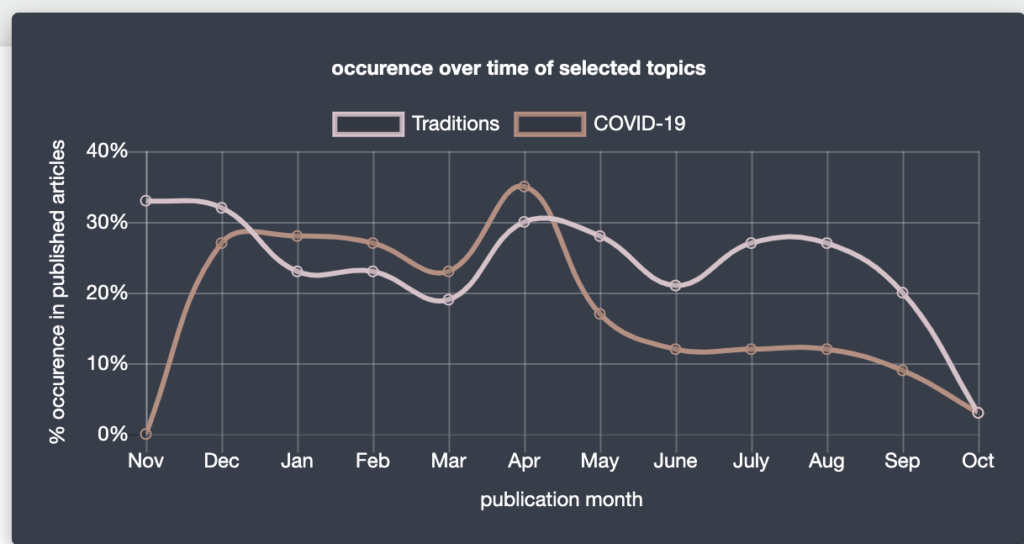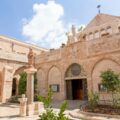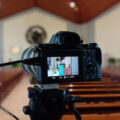Insights from the dashboard: The impact of COVID-19 on traditions
Insights from the dashboard: The impact of COVID-19 on traditions
How did COVID-19 impact religious traditions? Thanks to the dashboard tool, we can find the answer to this question.
How did COVID-19 impact religious traditions in Europe? We will examine this topic using the EARS dashboard tool. We will focus on the period between June 1st and October 1st 2021. During this period, out of 1,213 article summaries published on the dashboard, 38 discussed both the topics of tradition and COVID-19. Let’s analyse some of the main themes that appeared in these articles.

How did COVID-19 impact traditions in Spain? Returning to normal
In August 2021, the bishop of the Spanish city of Cordoba, Demetrio Fernandez, stated that the coronavirus pandemic continues to have an effect on the practice of the Catholic faith. He claimed that there is a continued fear of going to church due to consistent cases of COVID-19 in Spain. In addition, Fernandez spoke about the work that the charity Caritas has done to help support the poorest people in society during the pandemic.[1]
In September 2021, the first religious processions since COVID-19 restrictions were lifted took place in the Spanish region of Andalucia. The procession routes were shorter than they would normally be, with a reduced programme and without music in order to avoid a big crowd. However, this did not stop thousands of people from packing the streets to see the procession.[2] Religious processions are an important part of the culture of the southern Spanish region of Andalucia.[3] Thus, it seems Spain’s traditions are slowly coming back to normal.
How did COVID-19 impact traditions in Ukraine? The Hasidic pilgrimage
Since the coronavirus pandemic in Ukraine has begun to improve, at the beginning of September 2021, Jewish Hasidic pilgrims were allowed to come from Israel and other parts of the world to celebrate the holiday of Rosh Hashanah. Ukraine’s chief sanitary doctor, Igor Kuzin, said that hotel and restaurant workers were all vaccinated against coronavirus in the city so as to enable the celebration to be held in safe conditions.[4] For Rosh Hashanah, Hasidim come annually to Uman in order to celebrate this holiday and pray at the grave of the founder of Bratslav Hasidism – Rabbi Nachman of Breslov. The celebrations were cancelled in 2020 due to strict safety measures.[5]
Yet, at the end of this year’s celebrations, the Israeli government announced that it would prosecute dozens of Hasidic pilgrims travelling from Ukraine to Israel, as they flew back into the country with fake negative COVID-19 test results.[6] This case in Ukraine shows that some religious groups might not be taking the virus seriously anymore.
How did COVID-19 impact traditions in Ireland? Breaking the rules
In Ireland, in July 2021, amidst some coronavirus restrictions, Muslims celebrated Eid al-Adha. 500 members of Ireland’s Muslim community celebrated the festival in Croke Park stadium. In 2020, only 200 Muslims could attend socially distanced prayers because of COVID-19 restrictions. Dr Al-Qadri, who led the prayers in Croke Park this year, claimed that better days are yet to come. He said he was grateful that Croke Park was made available again for this unique and special moment.[7]
In August 2021, Irish Catholic bishops began to protest against a new government ban on First Communion and Confirmation ceremonies that was supposed to protect the faithful from the pandemic. The bishops claimed that this ban was discriminatory considering that the state had opened up much of Irish society.[8]
The Catholic Archbishop of Dublin, Dermot Farrell, told Catholic priests in his diocese that they have permission to proceed with First Communions and Confirmations despite the Irish Government’s public health advice. Writing to the priests, Archbishop Farrell explained that many people were disappointed by the government’s restrictions on the celebration of the sacraments, on the apparent grounds that they may breach public health guidelines on household mixing. However, other large gatherings, such as sporting events or weddings, were not prohibited. The archbishop stated that “many have concluded that…these guidelines are discriminatory” and that celebration of the sacraments could resume in autumn 2021.[9]
How did COVID-19 impact traditions in the UK? Christmas in the summer
In England, Reverend Rachel Phillips at the Priory Church of St Peter in Dunstable, Bedfordshire organised a Christmas celebration which took place in the middle of the summer. The celebration was organised for people who missed out on the traditional service in December 2020 due to coronavirus restrictions. Rev Phillips said that “last December we weren’t able to celebrate as we normally would, so we’re doing it now.” The Church of England rector maintains that “Christmas is not just for Christmas.” The outdoor event included traditional carols, mince pies, a small nativity play, and a visit from Father Christmas. [10]
British Muslims were also allowed to resume their public religious celebrations. For the first time since the beginning of the coronavirus pandemic, they were able to pray and worship together for the start of the festival of Eid al-Adha.[11]
Virtual religion
In addition to the return to regular religious behaviour and to in-person celebrations, many are still enjoying the benefits of virtual celebrations. In fact, for the second time, the Lourdes caves in France organised a virtual pilgrimage. Believers could join the prayer at the famous Maria sanctuary directly from their laptops – wherever they were in the world. The whole website was also improved in order to create the atmosphere of a real pilgrimage trip and prayers were sung in different languages.[12]
Moreover, as a result of COVID-19 health regulations, many religious organisations have been experimenting with digital broadcasting tools. Facebook has often been used to broadcast live religious events and ceremonies. In June 2021, the company organised a virtual summit around the theme of faith. Several tools were presented to help create virtual congregations or organise joint prayers. While Facebook’s interest in the spirituality of its users is not new, the trend has accelerated with the pandemic. Despite the enthusiasm of some company executives and religious leaders, questions remain. For instance, some sacraments cannot be performed remotely.[13] [14]
Is there a general tendency?
The general tendency that emerges from the dashboard is that Europe is slowly re-opening worship places and allowing religious celebrations – even with some restrictions. Yet, it appears that the virtual celebration of rituals remains an option for many faithful, something that may suggest that religious behaviour will never return to what it was before the pandemic.
Learn more
The EARS dashboard allows you to gain insight into a large number of topics, including COVID-19 and traditions. It is a free tool that enables you to make similar connections as described above, and to find out about new relationships between interesting subjects across Europe. Please visit the dashboard to learn more.
Sources
[1] “vuelvan a abrazarse pronto” Demetrio Fernández: “Todavía hay gente que tiene miedo de ir a la Iglesia”
[2] Año y medio después, las procesiones regresan a las calles de Sevilla
[3] Año y medio después, las procesiones regresan a las calles de Sevilla
[4] Ситуация с COVID-19 позволяет принять хасидов, заявил украинский Минздрав
[5] Ситуация с COVID-19 позволяет принять хасидов, заявил украинский Минздрав
[6] Israel to prosecute Hasidic pilgrims who faked negative Covid tests to fly home
[7] Eid al-Adha celebrations continue in Ireland and around the globe amidst Covid restrictions
[8] Irish Catholic bishops reject pandemic ban on sacraments
[9] Most senior Catholic prelate yet gives go-ahead to Communions despite public health advice
[10] Dunstable Christmas church celebration held in July
[11] Muslims in England return to celebrate Eid al-Adha together
[12] Deuxième édition du pèlerinage virtuel « Lourdes United »
[13] Comment Facebook réinvente l’expérience religieuse
[14] Pèlerinage vers un site marial, en mode virtuel – Le site de l’Eglise Catholique en Belgique






